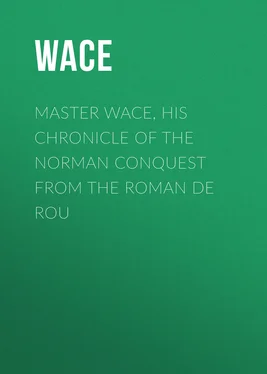Wace - Master Wace, His Chronicle of the Norman Conquest From the Roman De Rou
Здесь есть возможность читать онлайн «Wace - Master Wace, His Chronicle of the Norman Conquest From the Roman De Rou» — ознакомительный отрывок электронной книги совершенно бесплатно, а после прочтения отрывка купить полную версию. В некоторых случаях можно слушать аудио, скачать через торрент в формате fb2 и присутствует краткое содержание. Жанр: foreign_prose, История, foreign_edu, foreign_antique, на английском языке. Описание произведения, (предисловие) а так же отзывы посетителей доступны на портале библиотеки ЛибКат.
- Название:Master Wace, His Chronicle of the Norman Conquest From the Roman De Rou
- Автор:
- Жанр:
- Год:неизвестен
- ISBN:нет данных
- Рейтинг книги:4 / 5. Голосов: 1
-
Избранное:Добавить в избранное
- Отзывы:
-
Ваша оценка:
- 80
- 1
- 2
- 3
- 4
- 5
Master Wace, His Chronicle of the Norman Conquest From the Roman De Rou: краткое содержание, описание и аннотация
Предлагаем к чтению аннотацию, описание, краткое содержание или предисловие (зависит от того, что написал сам автор книги «Master Wace, His Chronicle of the Norman Conquest From the Roman De Rou»). Если вы не нашли необходимую информацию о книге — напишите в комментариях, мы постараемся отыскать её.
Master Wace, His Chronicle of the Norman Conquest From the Roman De Rou — читать онлайн ознакомительный отрывок
Ниже представлен текст книги, разбитый по страницам. Система сохранения места последней прочитанной страницы, позволяет с удобством читать онлайн бесплатно книгу «Master Wace, His Chronicle of the Norman Conquest From the Roman De Rou», без необходимости каждый раз заново искать на чём Вы остановились. Поставьте закладку, и сможете в любой момент перейти на страницу, на которой закончили чтение.
Интервал:
Закладка:
When the Viscount of the Costentin, and the Viscount of the Bessin knew that William was coming, and was determined to fight, and had brought with him the King of France, in order to conquer them with his aid, they gave heed to evil counsel; and in the pride of their hearts, disdained to restore to him his own, or to seek peace or accept it. They sent for their people, their friends and relations, from all quarters; the vavassors and the barons, who were bound by oath to obey their commandment, were all sent for and summoned. They passed by various rivers and fords, and assembled at Valedune.
Valedune is in Oismeiz, between Argences and Cingueleiz 29 29 A small district, of which Harcourt-Thury is the principal place.
; about three leagues from Caen, according to my reckoning. The plain is long and broad, without either hill or valley of any size. It is near the ford of Berangier, and the land is without either wood or rock, but slopes towards the rising sun. A river bounds it towards the south and west.
At Saint Briçun de Valmerei 30 30 Valmeray, near Croissanville.
, mass was sung before the king on the day of that battle, and the clerks were in great alarm. The French armed and arranged their troops at Valmerei, and then entered Valedune. There the communes 31 31 'Li cumunes,' the troops brought by the barons from their villages and towns. See the very curious passage in Wace , vol. i. page 307, as to another sense of 'cumune,' in his account of the popular insurrection against Duke Richard II.
assembled well equipped, and occupied the river's bank. William advanced from Argences, and passing at the ford of Berangier, followed the river's course till he joined the French. His men were on the right, and the French on the left hand, with their faces towards the west, for their enemies came from that quarter.
Raol Tesson de Cingueleiz 32 32 One of the greatest proprietors in Normandy: we shall find his son subsequently, as one of those present at Hastings.
saw the Normans and French advancing, and beheld William's force increasing. He stood on one side afar off, having six score knights and six in his troop; all with their lances raised, and trimmed with silk tokens 33 33 Tuit aloent lances levées Et en totes guimples fermées. M. Pluquet in his notes interprets guimples as 'cornettes de taffetas attachées à la lance:' for which purpose the knights may have already learned to adopt the colours or tokens of their ladies.
. The king and Duke William spoke together; each armed, and with helmet laced. They divided their troops, and arranged their order of battle, each holding in his hand a baston; and when the king saw Raol Tesson with his people standing far off from the others, he was unable to discover on whose side he was, or what he intended to do. "Sire," said William, "I believe those men will aid me; for the name of their lord is Raol Tesson, and he has no cause of quarrel or anger against me." Much was thereupon said and done, the whole of which I never heard; and Raol Tesson still stood hesitating whether he should hold with William.
On the one hand the viscounts besought him, and made him great promises; and he had before pledged himself, and sworn upon the saints at Bayeux, to smite William wherever he should find him. But all his men besought and advised him for his good, not to make war upon his lawful lord, whatever he did; nor to fail of his duty to him in any manner. They said William was his natural lord; that he could not deny being his man; that he should remember having done him homage before his father and his barons; and that the man who would fight against his lord had no right to fief or barony.
"That I cannot dispute," said Raol; "you say well, and we will do even so." So he spurred his horse forth from among the people with whom he stood, crying TUR AIE 34 34 'Thor-aide,' according to M. Pluquet, which he considers may have been derived from the ancient North-men. Another MS. reads 'Turie:' and M. Le Prevost considers the latter to be the true reading, and that the cry was really Thury, and most probably referred to the chief seat of Raol Tesson.
; and ordering his men to rest where they were, went to speak with Duke William. He came spurring over the plain, and struck his lord with his glove, and said laughingly to him, "What I have sworn to do that I perform; I had sworn to smite you as soon as I should find you; and as I would not perjure myself, I have now struck you to acquit myself of my oath, and henceforth I will do you no further wrong or felony." Then the duke said, "Thanks to thee!" and Raol thereupon went on his way back to his men.
William passed along the plain, leading a great company of Normans, seeking the two viscounts, and calling out on the perjured men to stand forth. Those who knew them pointed them out on the other side among their people.
Then the troops were to be seen moving with their captains; and there was no rich man or baron there who had not by his side his gonfanon, or other enseigne, round which his men might rally; and cognizances or tokens, and shields painted in various guises 35 35 Congnoissances u entre-sainz, De plusors guises escuz painz.
. There was great stir over the field; horses were to be seen curvetting, the pikes were raised, the lances brandished, and shields and helmets glistened. As they gallop, they cry their various war cries: those of France cry, MONT-JOIE! the sound whereof is pleasant to them. William cries, DEX AIE! which is the signal of Normandy; and Renouf cries loudly, SAINT SEVER, SIRE SAINT SEVOIR 36 36 The cry of Saint Sever! has been noticed in a preceding note.
; and Dam as-denz goes crying out, SAINT AMANT! SIRE SAINT AMANT 37 37 The church of the commune called le vieux Thorigny is stated to have been dedicated to St. Amand; but see the observations in Mém. Ant. Norm . v. 221.
!" Great clamour arose in their onset; all the earth quaked and trembled; knights were pricking along, some retiring, others coming up; the bold spurring forward, the cowards shrinking and trembling.
Against the King of France and the Frenchmen came up the body of the Costentinese; each party closing with the other, and clashing with levelled lances. When the lances broke and failed, then they assailed each other with swords. Hand to hand they fight, as champions in the lists, when two knights are matched; striking and beating each other down in many ways; wrestling and pushing and triumphing whenever any one yields. Each would be ashamed to flee, each tries to keep the field, each one boasts of his prowess with his fellow; Costentinese 38 38 Men of the Cotentin, a district comprehended in, though not so large as, the present department of La Manche.
and French thus contending with each other.
Great is the clamour and hard the strife; the swords are drawn, the lances clash. Many were the vassals to be seen there fighting, serjeants and knights overthrowing one another. The king himself was struck and beat down off his horse. A Norman whom no one knew had come up among them; he thought that if the king should fall, his army would soon be dispersed; so he struck at him 'de travers,' and overthrew him, and if his hauberk had not been very good, in my opinion he would have been killed. On this account the men of that country said, and yet say, jeering,
From Costentin came the lance
That struck down the King of France 39 39 De Costentin iessi la lance, Ki abati le rei de France.
.
and if their knight had got clear away, they might well pass with their jeer. But when he tried to go off, and his horse had begun its course, a knight came pricking, and hit him, striking him with such violence as to stretch him out at full length. And he soon fared still worse than even that; for as he recovered himself, and would have mounted his horse, and had laid his hand on the saddle bow, the throng increased around, and bore him from the saddle, throwing him down; and the horses trod him underfoot, so that they left him there for dead.
Читать дальшеИнтервал:
Закладка:
Похожие книги на «Master Wace, His Chronicle of the Norman Conquest From the Roman De Rou»
Представляем Вашему вниманию похожие книги на «Master Wace, His Chronicle of the Norman Conquest From the Roman De Rou» списком для выбора. Мы отобрали схожую по названию и смыслу литературу в надежде предоставить читателям больше вариантов отыскать новые, интересные, ещё непрочитанные произведения.
Обсуждение, отзывы о книге «Master Wace, His Chronicle of the Norman Conquest From the Roman De Rou» и просто собственные мнения читателей. Оставьте ваши комментарии, напишите, что Вы думаете о произведении, его смысле или главных героях. Укажите что конкретно понравилось, а что нет, и почему Вы так считаете.












